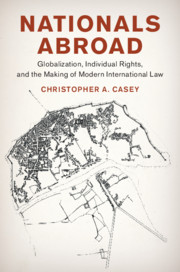Book contents
- Frontmatter
- Dedication
- Contents
- Acknowledgments
- Abbreviations
- Introduction
- Part I Mise-en-scène: The International Legal World, 1850–1914
- Part II Mise-en-scène: The International Legal World, 1919–1939
- Part III Mise-en-scène: The International Legal World, 1945–Present
- 6 Cosmopolitans and Capitalists
- Conclusion
- Notes
- Index
6 - Cosmopolitans and Capitalists
from Part III - Mise-en-scène: The International Legal World, 1945–Present
Published online by Cambridge University Press: 29 June 2020
- Frontmatter
- Dedication
- Contents
- Acknowledgments
- Abbreviations
- Introduction
- Part I Mise-en-scène: The International Legal World, 1850–1914
- Part II Mise-en-scène: The International Legal World, 1919–1939
- Part III Mise-en-scène: The International Legal World, 1945–Present
- 6 Cosmopolitans and Capitalists
- Conclusion
- Notes
- Index
Summary
In the latter half of the twentieth century, there was no tacit or express global agreement to reduce or eliminate dual nationality. In fact, dual nationality has proliferated since the 1970s. While the erosion of coverture globally has, for the most part, eliminated the problems faced by married women with regard to their nationality, little other progress has been made on the subject. In the postwar world, the international legal system shifted away from nationality and protection by states – embracing instead an individualist paradigm. As Eduard Benes said, ``The protection of minorities in the future should consist primarily in the defense of human democratic rights.’’ And so, alongside the Charter of the United Nations was born the Universal Declaration of Human Rights. René Cassin, one of the drafters of the Universal Declaration, like Benes, was dubious and, at times, scornful of the minorities regime. The Universal Declaration as a set of legal norms and principles, thus, should be read in the context of the rejection of group-based rights systems – particularly those dependent upon nationality as a legal status. In its place emerged a system of individualized international rights.
Keywords
- Type
- Chapter
- Information
- Nationals AbroadGlobalization, Individual Rights, and the Making of Modern International Law, pp. 171 - 191Publisher: Cambridge University PressPrint publication year: 2020



